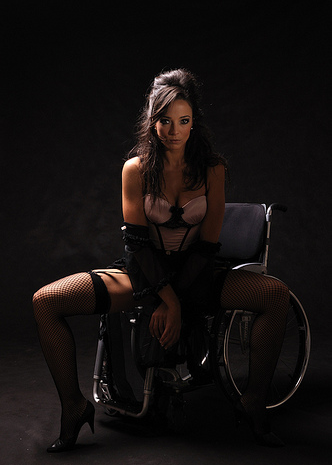
Disability is the reason that I’m no longer a dancer. Occasionally, I’d fool myself and go back to work for a while, and then remember why I can’t do it anymore. The spirit is willing, but the flesh is weak. Dancing is hard on the body – and for my body, it’s particularly difficult. I’m having a hell of a time with chronic pain, and as it stands right now, it’s painful when I walk or drive. Thinking I can dance an eight-hour shift these days is an exercise in self-delusion.
I’m Mel, formerly known as Valkyrie. I started dancing when I was 20, and I retired this year. I’m bipolar, and I’m also physically disabled. I have a connective tissue disorder called Ehlers-Danlos Syndrome (EDS). My joints are very easily dislocated, and I have issues with back and neck misalignment, dislocations, subluxations, moderate to severe chronic pain, and chronic fatigue. Think major arthritis and a hand tremor, and that’s the reality of the body I’m living in. I should mention that I am about to turn 31, and none of these conditions are readily apparent unless I talk about them, or unless I’m visibly wearing braces.
Disability is pretty common in the sex work industry—overwhelmingly, invisible disability. Many sex workers choose sex work because they can pick their own hours. The ability to earn high amounts of money in a short period of time really helps conserve spoons/limited energy, which is particularly helpful when dealing with a painful condition. Many dancers, models, cam girls, and full-service workers suffer from chronic pain or physical limitations. Mental illness is also very common; I’ve personally run into people with PTSD, depression, bipolar disorder, and at least one sociopath (who, lest you get the wrong idea, is a friend of mine and a wonderful person, all stereotypes to the contrary). Mental illness can be disabling to a greater or lesser degree, depending upon circumstances.
I have some tips for those of us who are dealing with disability. Then I’ll be discussing disabled customers and how we can interact with them in a way that’s good for both them and us.
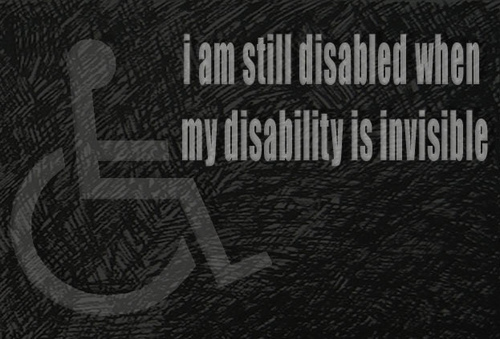
Protect Your Brain
Making sure you’re doing okay mentally is top priority, particularly when you’re mentally ill. So as with all civilian jobs, make sure that your workplace isn’t exacerbating any condition you may have. I found it particularly helpful to talk to a counselor sometimes, just to make sure I kept my bipolar symptoms in check. Most sliding-scale clinics will have resources for counseling, and/or for seeing a psychologist or psychiatrist.
If you’re experiencing burnout and need a break, take one if it’s even remotely possible. Sometimes the money you might make isn’t worth the hit to your mental balance, and it’s worth it to take time off when you’re not feeling stable. Self-care is important, so make sure you’re doing okay, both in and out of work. If you’re not feeling okay, please reach out – even if it’s just bitching about your job on Twitter and having others in the community commiserating, it’s good to have an outlet. Interacting with other disabled sex workers online has completely changed the way I think about my body, and it’s helped me be much kinder to myself when I can’t do something the way I used to, or the way I feel I should.
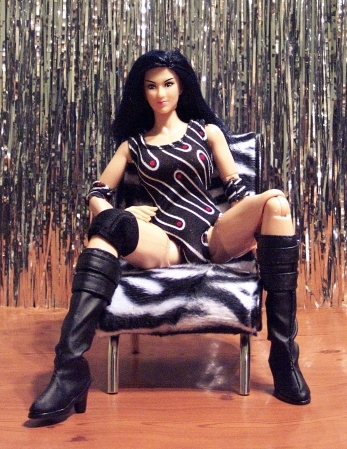
Handling Physical Disability as a Stripper/Sex Worker
For me, it was difficult to deal with physical discomfort/pain and also pretend to be a super-sexpot, so over the years I developed a few tricks to help make dancing easier on my body. I stretched before I went out on the club floor, to help prevent my back from getting (more) messed up. If my back was already feeling awful, I tried not to twerk, since it’s something I know is hard on my back. I spent every possible moment sitting, or out of my heels entirely. I wore knee high boots to prevent me from turning my ankles. I was almost never without leg warmers or stockings that I could pull over my knees, both because my legs were covered with bruises all the time (EDS often leads to very easy bruising), and because I was trying to protect my knees as best I could.
Knee braces (compression) and knee pads can really help, if you’re dealing with knee pain or instability. One woman I knew wore over-the-knee boots for the sole purpose of wearing knee pads underneath them. Ankle braces are also an option for joint stability—I know it’s a lot of stuff to have on your legs, but if it prevents injury, it’s worth doing. If you’re having balance problems or mobility difficulties that can be helped by using a cane, consider getting one. There are tons of attractive canes out there, and googling “custom canes” will get you a boatload of options.
It can be a bit difficult to camouflage braces and knee pads, hence my perpetual leg warmers. You can find something comfortable to wear over them, or you can wear braces and mobility aids openly and be accosted with a bazillion less-than-intelligent questions, but also take the opportunity to spread a little bit of disability awareness. Not that drunk people in a strip club are a particularly receptive audience for disability advocacy, but you never know. Disability isn’t some magical anti-sexy curse, and if you don’t want to hide your mobility aids, then don’t!! The more disability is seen, the less marginalized it will be.
This next piece of advice will have most dancers rolling their eyes, unless they’re in Portland (home of strippers who go barefoot, or wear Doc Martin-style boots, flip flops, ballet slippers… yes, these are all things that I have personally seen in the club), but I’ll say it anyway: if you can at ALL avoid wearing heels, do it. Run from them. Or at the very least, try to go for something with ankle support and a relatively low heel. I know it’s not the sexiest choice, but it helps to get out of the heels as much as you can, particularly if you have back problems, and/or knee or ankle issues.
The sad fact is, dancing in clubs is pretty unavoidably strenuous and hard on your body if you’re disabled. I eventually switched to doing private parties/clients only for that very reason. If you’re not in a club, you don’t have to be on your feet as much – and you don’t have to wear heels at all, if you’re not inclined. Leaving the strip club setting certainly allowed me to keep working longer than I would have been able to otherwise. It may be worth it to consider private clients; it may be worth considering switching to a different branch of sex work.
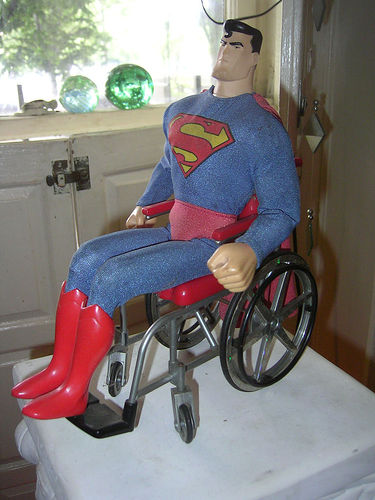
Customers with Disabilities
The number one most important thing about sex work and disability is this: people are people. This seems like the simplest principle in the world, but I have seen so many strippers avoid guys in wheelchairs just because they’re in a chair. Perhaps they think wheelchairs equal mental incompetence? If someone is up for coming into a strip club, then they’re up for the activities at a strip club. They’re there for the same reason anyone else is: tits and ass.
Sometimes, it may be difficult to communicate over the music if the customer has difficulty with speaking loudly, or if they are hard of hearing. Often, if communication is an issue, the person will come in with friends who can help facilitate conversation. I will say that “what happened to you?” is a terrible line of dialogue unless the customer has already brought up the subject. Asking can be perceived as rude, and it doesn’t really matter, does it? They’re there for boobs.
Whether a customer has a cane and a bad knee or a power wheelchair, they’re all going to appreciate this: ask before you do anything. Ask if it would be painful if you sat in their lap, or if they’re fine with that. It’s always better to get an enthusiastic yes and a “Duh,” than it is to inadvertently hurt a customer. There’s never anything wrong with obtaining consent!
Canes and crutches aren’t too difficult to adjust for when you’re dancing for someone, minus the occasional tripping hazard. Usually, they’re easily removable from someone’s person until they need them. As a courtesy, please don’t put a mobility aid out of its owner’s reach.
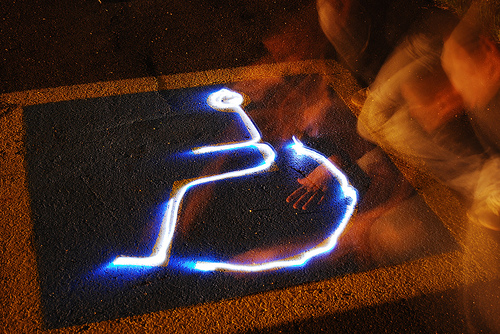
Wheelchairs sometimes need a bit of adapting to when it comes to lap dances, but it depends on how you’re used to doing dances. If you’re used to couches and being able to straddle someone, then lap dancing in a wheelchair will be a bit different. But if you’re working at a club that does table dances or has rolling dance chairs, then you’ve probably already got the technique down. Just as you have to be wary of a rolling chair when doing a lap dance, you should also avoid inadvertently rolling someone’s wheelchair.
Wheelchairs have a BIG advantage over rolling chairs, though – they have brakes! Ask the person if their brakes are set before you begin dancing – making sure their chair is stationary will help you out. Just don’t mess with their chair without permission. Unless someone asks you to help specifically, it’s always better to leave somebody’s mobility aids in their control.
Power wheelchairs are often taller than manual wheelchairs, and so sometimes pose a problem simply because of the height of the chair. Often it’s easier to do a standing dance for someone in a power chair. You can dance on either side of the chair for some variety, if their particular setup lets you get close on the sides. Be particularly careful if the person has any sort of breathing aid – a ventilator, or an oxygen tank, etc. Make sure that your customer is breathing easily and that you don’t accidentally knock out a nose piece.
When it comes to the intersection of disability and sex work, there’s plenty we can do to ensure disabled dancers have a good experience in the workplace, and that disabled customers aren’t marginalized while seeking sex work services. The sex work community is chock full of people with disabilities, and we’re all better off when we acknowledge that, and work towards helping each other out. If you have advice for handling disability or ideas/tips I didn’t cover, please comment or e-mail me!
This is a fascinating article – I had no idea that this was a consideration at strip clubs and that accommodations were available. Thank you for writing!
Thank you for writing about this! Invisible chronic pain and weakness from injury feels a curse when we push ourselves to match our prior abilities.
I haven’t had severe rheumatoid arthritis since I was a baby. It comes with chronic pain, extremely limited range of motion, and pretty obvious deformities. I haven’t had severe rheumatoid arthritis since I was a baby. It comes with chronic pain, extremely limited range of motion, and pretty obvious deformities. Becoming a dad for my mind-body balance. I’m trying to write about the different aesthetics and intimacies (and performances of physicality) that come up while doing this work with a very physically disabled body. How can I follow you or either the writings? I love I finally live in a time wheb this stuff is just matter-of-fact–not an eroticized poster child trope!
So refreshing to know I’m not alone in this! 🙂 I’m a stripper and also have EDS as well as dysautonomia, and sometimes I feel so inadequate trying to do my job knowing the toll it takes on my body. Thank you for positing this <3
I am a Dancer with EDS myself.. have been dancing for 3 years now and I am finding it harder and harder to bear. I have the Hypermobility type and it “makes for great party tricks” when I “show how flexible I am”.. but god does it hurt.
I was very, VERY shocked to see that this article existed, and from an ex-dancer WITH EDS just as I.. I am crying to know I am not alone.
I may be 25 (in a little while) but they said I should start to anticipate wheelchairs by 30-35.. but I love my job too much to try to slow that down.
I also suffer a myriad of other disabilities, equally mental and physical. But that is not important. I just wanted to comment to mention the fact I have high, high respects for you, and anyone else who Dances/SWerks with disabilities.
I’m disabled and limited work , I wanted to know are you able to work as a stripper on disability